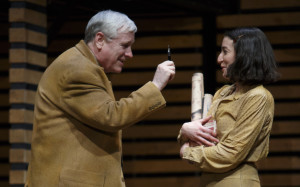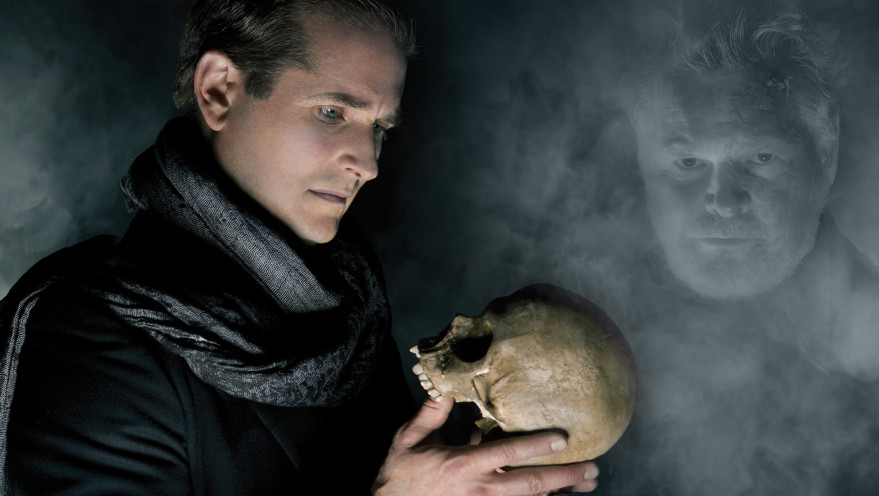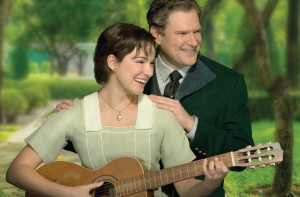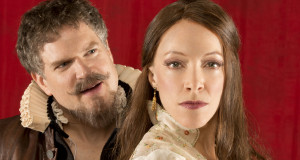STRATFORD — The Stratford Festival’s opening week was its most successful in years. The week launching its 63rd season was strengthened by a pair of solid productions the following week.
Of the eight productions, only one — Carousel — was an unequivocal disappointment. An impressive record. Most encouraging was the fact that the works of William Shakespeare were well served. All in all, it was enough to make The Bard smile.
Hamlet has been good to the festival its last couple of outings. Or more accurately, the festival has been good to Hamlet.
British director Adrian Noble’s 2008 production, with Ben Carlson in the title role, was superb. The production and its leading man were revelatory. It confirmed Carlson — who made his way to Stratford with his wife Deborah Hay via the Shaw Festival — as a major festival artistic asset.
Launching the season with arguably the greatest play in the English language generates an aura of occasion. The sense of excitement this year was heightened by the quality of the production, directed by festival artistic director Antoni Cimolino, who extended his string of insightful and memorable Shakespearean productions.
He has clearly picked up the artistic torch from former artistic directors who brought interpretive flare to Shakespeare including Michael Latham, John Hirsch and Robin Phillips.
Hamlet begins as a murder mystery with a supernatural element and continues as a political thriller darkened by shades of adultery, incest and madness. It ends as a bloody tragedy when justice is usurped by revenge.
It’s a lot to absorb. It requires a director with clear-eyed vision that binds intellect and emotion with wit. This is one of the most humane productions of Hamlet you are apt to see.
Teresa Przybylski’s set is anchored by shiny, black cubes that are both practical (stools and desk drawers, turrets and church pews) and metaphorical (head stones and war memorials, city skyscrapers in miniature and ancient standing stones). In a play that holds up a mirror to nature, dark reflections abound.
The Danish Prince requires more from an actor than any other Shakespearean role. As a result, actors often drown in the quagmire of extremes, either too cerebral or too visceral, too intellectual or too emotional, too rational or too insane, too manic or too melancholic.
Jonathan Goad, a University of Waterloo grad in his 13th festival season, embraces the character’s perplexing ambiguity and, in the process, delivers a career-defining performance.
The always dependable Geraint Wyn Davies makes for a treacherous Claudius because he is such a smooth, political operator, while Seana McKenna is a cooly regal Gertrude, her loyalty divided between son and husband.
Adrienne Gould’s performance breaks the mould of the ethereal, porcelain-fragile Ophelia. She retains her sexuality to the sad, bittersweet end.
Tom Rooney plays Polonius as more of a Shakespearean clown than comic buffoon.
Hamlet continues through Oct. 11 at the Festival Theatre.
The Sound of Music is a triumph for Donna Feore, her creative team and cast, including real-life children (some of whom reside in Waterloo Region).
The production confirms Feore as the most dependable director/choreographer of Broadway style musicals on the Festival Theatre’s notoriously difficult thrust stage.
The Rodgers and Hammerstein classic is famously saccharine. Feore, however, replaces sticky sentimentality with honest emotion.
The story of Maria and the singing von Trapps is familiar. Nonetheless, Feore embroiders tired, threadbare ideas into a vibrant, new tapestry.
She has the perfect Maria in Stephanie Rothenberg. Beginning as a salt-of-the-earth innocent, Maria grows in sophistication as she falls for Captain von Trapp. And Rothenberg has a voice as pure as a mountain trout stream.
In Ben Carlson, Feore has the perfect Captain von Trapp. When he sings the first few bars of the title song, he conveys the emotional foundation on which the song is built. A gifted actor with fine pipes, his rendering of Edelweiss is bathed in both nostalgia for a lost world and sadness at the emergence of a new world order.
The production reveals its aspiring greatness in early scenes with Anita Krause’s wondrously voiced Mother Abbess and a trio of nuns featuring Monique Lund, Glynis Ranney and Alexis Gordon. But when the von Trapp siblings hit the boards, it becomes as clear as an alpine spring that the production is destined for greatness.
Cambridge-bred Michael Gianfrancesco designed an elegant set.
The Sound of Music continues through Oct. 18 at the Festival Theatre.
I was unfamiliar with The Physicists before seeing it at the festival, confirming the kind of programming a great classical company must achieve. At first blush, you might ask why the festival is mounting Swiss playwright Friedrich Durrenmatt’s dark satire about the machination of the Cold War now.
The quick answer is that, with the Russian invasion of Ukraine in recent months, it appears the Cold War has not thawed completely.
But if you stand back from the play’s political foreground, you can apprehend a philosophical examination of the nature of science, especially when theoretical science is applied to practical matters.
Moreover, the production has a lot going for it. Award-winning Canadian playwright Michael Healey’s new stage adaptation, commissioned by the festival, is ably directed by Miles Potter.
The acting is also first-rate, beginning with Randy Hughson as the cynical police detective called in to investigate a murder in an insane asylum. His investigation focuses on three patients who were celebrated physicists before being institutionalized.
One, Herbert Georg Beutler, claims to be Isaac Newton. Another, Ernest Heinrich Ernesti, claims to be Albert Einstein. A third, Johann Wilhelm Möbius, insists he harbours visions of the Biblical King Solomon. Overseeing the patients is Fraulein Doktor Mathilde von Zahnd, a misshapen psychiatrist who might be nuttier than her three patients combined.
The mad quartet makes for a superb ensemble. As Einstein, Mike Nadajewski impersonates everybody’s idea of an absent-minded professor. Graham Abbey prances around as a cognac-sipping, limp-wrested Newton, complete with powdered wig. Geraint Wyn Davies is the most sympathetic of the three, a tortured soul who grieves the havoc his genius is capable of wreaking on humanity. Sean McKenna is compelling as the disturbed, and deeply disturbing, Fraulein Doktor.
The Physicists is a strangely entertaining intellectual charade, inside a comic conundrum, inside a moral quandary.
The Physicists continues through Sept. 27 at the Tom Patterson Theatre.

Joseph Ziegler as Mr. Frank and Sara Farb as Anne Frank in The Diary of Anne Frank. Photography by David Hou.
Seventy years ago a darkness was lifted when Europe was liberated from Nazism. To celebrate this historic event, the festival is mounting The Diary of Anne of Frank for the second time in its history.
Thanks to film and television, not to mention theatre, The Diary of Anne Frank is an overly familiar story. Everyone knows how the story ends. Consequently, it is intensely emotional, which makes it easy for a competent director with a reliable cast to pluck audience heartstrings.
Jillian Keiley will have none of this. She bravely turns her back on tradition and convention and transforms something we know all-too-well into something we see anew. The task is risky, but the rewards are commensurate with the challenge.
Admittedly, this production is not for everyone. The opening night audience extended a standing ovation, but it was reserved, solemn even. Was it because people were quietly moved or rather perplexed?
Keiley isn’t concerned with historical verisimilitude — how do you tell the story of the genocide of six million innocent people? — but with the metaphor of dream transformed into nightmare.
The new approach starts with the cast addressing the audience directly, telling brief personal stories that shatter the barrier between actor and audience, while connecting actor and audience to Anne, the writer of the famous diary and the character in the play.
Throughout the production, different actors move to the front of the stage to read excerpts from Anne’s diary directly to the audience. It’s very moving.
Keiley effectively introduces a chorus, not the classical Greek variety, but vocalists who provide a minimalist, a cappella soundscape echoing the minor keys common in Jewish music, composed by Jonathan Monro.
Similarly, actors sometime move around as if they are in a choreographed dance — underscoring the idea of dreamscape/nightmare.
Then there’s Bretta Gerecke’s minimalist set, consisting entirely of horizontal slats. The slats are reminiscent of the cattle cars that — we already know — transport Anne and her family, the van Daans and Mr. Dussel to the death camps. The slats also suggest plaster laths exposed in old attics, as well as horizontal bars, representing both a safe hiding place and a prison of confinement.
Sara Farb plays Anne as if she knew the character personally, conveying the precocity, vitality, rebelliousness, energy, will and nascent sexuality — in a phrase, indomitable spirit.
Joseph Ziegler and Lucy Peacock are both exceptional as Anne’s mother and father. Ziegler is a model of intelligence and dignity under duress, while Peacock wrings out every ounce of empathy by giving us a strong woman cracking under unbearable strain.
Less about Carousel the better.
The difference between Feore’s inspired offering and Susan H. Schulman’s production by rote is, whereas The Sound of Music transcends its limitations of theme, time and place, Carousel is defeated by the same criteria.
Schulman sheds no new light, offers no new perspective and provides no fresh reading. It’s almost as if she took on the assignment out of protest, which might explain the unusually perfunctory standing ovation it received.
Let’s penetrate to the heart of the problem.
Attitudes and values in North America have changed since 1945 when Carousel debuted, including our growing intolerance of domestic abuse. But you wouldn’t know it from watching this production.
The domestic violence that runs through Carousel like a polluted New England river is the byproduct of the toxic sexism and chauvinism that shapes the behaviour of both male and female characters.
It makes for uncomfortable viewing because Schulman fails to find an interpretive approach that respects the integrity of the musical while being less offensive. Instead, she gives us a production that seems curiously dated. The result is a period piece without the charm of nostalgia to soften the blows of what we witness on stage.
The casting is problematical.
The carousel barker Billy Bigelow — the violent young man in search of a loving soul — is a minefield and Jonathan Winsby doesn’t make much headway. Alexis Gordon is a spunky sweetheart as Julie Jordan, but she doesn’t create much romantic chemistry with Billy.
Robin Hutton is excessively over-the-top as the bossy Mrs. Mullin, a condition that infects many of the characters like a bad case of the measles. In contrast, the most grounded performances are offered by Robin Evan Willis as Carrie Pipperidge and Alana Hibbert as Julie’s cousin Nettie.
The production’s problems are encapsulated in one character, Jigger Craigin. Evan Buliung is a powerful actor, but here he goes through the motions. It’s like a roaring Porche that never gets out of first gear.
Carousel continues through Oct. 16 at the Avon Theatre.
Scott Wentworth has done good work as a festival actor over two decades. He has extensive directing experience outside of the Stratford and in 2001 made his festival directorial debut with Henry IV, Parts 1 and 2.
Wentworth knows his Shakespeare, which he brings to bear on his offering of Pericles, the least performed of Shakespeare’s late romances.
In conventional romance fashion, the epic adventure is something of a dog’s breakfast, with episodes that take the Prince of Tyre to assorted exotic locales. Add the convoluted plot, melodramatic situations, vaudevillian comedy and ubiquitous coincidences and you end up with a woolly narrative.
Wentworth stays the course by framing his production in two ways.
First, he sets the story in Victorian times, as if the epic were written by Charles Dickens, the master of taming wildly unruly plots.
Second, he interprets Pericles’ journey not as an external, Homeric voyage, but as an inner psychodrama with a unifying spiritual dimension. Geography is subordinated to dream, nightmare and vision. Carl Jung would be pleased
We have the classical goddess Diana — played by a deeply affecting Marion Adler — and her chorus of maiden priests dressed in habits, a constant reminder that our hero is embarked on a spiritual quest.
We see some actors in multiple roles. For example, the kings are played by Wayne Best and the assassins are played by E. B. Smith. Most brilliant of all, we have a transcendent Deborah Hay playing Pericles’ wife Thaisa and their daughter Marina.
Pericles is one of Shakespeare’s lesser known works, even among the late romances of Cymbelline, The Winter’s Tale and The Tempest. Disregarding the exotic names and places, the story is simple in outline.
After solving a riddle hiding a court secret of incest, Pericles flees a tyrant’s vengeance. He finds love, but a storm at sea apparently kills his wife as she gives birth to a daughter, who is also lost, presumed dead but saved by pirates, only to be forced into prostitution. (Can’t you see Johnny Depp in the Disney adaptation?)
Years pass in the blink of an eye, before fate guides our wandering hero to reunion with daughter and wife. It’s a touching scene of rebirth and reconciliation that Wentworth and his cast orchestrate beautifully.
Evan Buluing’s Pericles is a compelling study of a man who navigates his way through the dark night of the soul to find wholeness and completeness in a fractured, fragmented world. His inner journey is a quest for love and family.
Pericles is very much an ensemble play and Wentworth gets fine supporting performances from Stephen Russell as the loyal Helicanus, Claire Lautier and Sean Arbuckle as the nasty step-parents Dionyza and Cleon, Brigit Wilson as the brothel madam Bawd, Randy Hughson as the rascal Bolt and Antoine Yared as the redeemed cad Lysimachus.
Wentworth adds one delicate touch that works beautifully. He incorporates The Pearl, a song with lyrics by Adler and music by Paul Shilton, that is sung first by Pericles and later by Diana.
Pericles continues through Sept. 19 at the Tom Patterson Theatre.
Cimolino made the week following opening week more interesting by pairing The Taming of the Shrew with She Stoops to Conquer.
Shakespeare’s satirical battle of the sexes and Oliver Goldsmith’s 18th century comedy of manners both hinge on a heroine named Kate adapting her status to win her beau.
Subtitled The Mistakes of a Night, Goldsmith’s romantic comedy transfers the convention of mistaken identity from a character to a location — in this case an elegant country mansion for a rowdy alehouse.
The comedy hinges on mischief, deception and confusion. The night of mistakes that turns the Hardcastle country house “topsy turvy” leads to “a merry morning.”
Martha Henry directs the production with predictable proficiency. She demonstrates faith in the comedy’s integrity, allowing the story to unfold as it will, without shoehorning extraneous elements that pinch toes. Goldsmith doesn’t set out to expose any glaring societal shibboleths and Henry doesn’t go looking for any. This is comedy for comedy’s sake.
The cast is anchored by Joseph Ziegler and Lucy Peacock as Mr. and Mrs. Hardcastle.
Ziegler’s bumbling Mr. Hardcastle epitomizes breeding and decency. He grounds the comedy, which occasionally threatens to spin out of control. Since making her festival debut 28 years ago, Peacock has demonstrated a knack for 18th century comedy, and as Mrs. Hardcastle she spews genteel vindictive with gleeful abandon.
The comic mayhem revolves around two young women and their paramours. Maev Beaty’s Kate oozes femininity, combining sensitivity with strength of will. Sara Farb is equally effective as cousin Constance, a woman who knows what she wants.
The two young paramours start with Brad Hodder as Marlow, a man tongue-tied when addressing women of equal caste, but a slippery tongued cad when chasing barmaids and servant girls. Tyrone Savage is as slick as old-fashioned hair oil as Marlow’s companion George.
The engine behind the mischief that dupes Marlow and Hastings is Tony Lumpkin, Mrs. Hardcastle’s son by a previous marriage. Theatregoers might well detect a Chris Farley like demeanour in Karack Osborn’s super-sized Lumpkin.
Douglas Parashcuk’s revolving, naturalistic set is lavish, complemented by Charlotte Dean’s period costumes that scale the social ladder with ease.
Thanks to Henry and Company, Goldsmith’s enduring comedy satisfies as a deliciously forbidden confection — high in calories, low in nutrition.
She Stoops to Conquer continues through Oct. 10 at the The Avon Theatre.
The term “battle of the sexes” is a tired and tiresome phrase. But it remains the most succinct description of Shakespeare’s nuptial comedy The Taming of the Shrew.
For centuries, the comedy pitting Petruchio against Katherina on a raucous courtship battlefield was viewed as great, good fun. But since the feminist revolution a half century ago, the comedy has been dogged by controversy.
Troubling issues in the world beyond literature and outside of theatre have made matters worse. We need look no further than such beloved celebrities as Bill Cosby and Jian Ghomeshi to appreciate how The Taming of the Shrew proves problematic for contemporary audiences.
The best way of defending the play from the slings and arrows of rebuke and condemnation is offering a production that challenges what we think we know of Shakespeare. Enter director Chris Abraham and real-life partners Ben Carlson and Deborah Hay.
Beginning with Othello and continuing with last season’s gender-bending A Midsummer Night’s Dream, Abraham has brought a singularly individual sensibility to Shakespeare. His Shrew continues the break-the-mold pattern.
Beginning with a framing device, an Abraham signature which is hilarious, especially for festival patrons who get the inside jokes, Abraham offers an usually physically combative Shrew.
Abraham interprets courtship as a form of theatre — even if veering too close to vaudevillian melodrama at times — in which lovers play roles, whether assigned by parents, class, status, social attitudes or romantic expectations. We are all players, in interchangeable parts — or so Abraham would have it.
Carlson and Hay first jousted with their wits, wiles and wills as Benedict and Beatrice in a 2012 festival production of Much Ado About Nothing. The romantic sparks fly again with more ferocity here, producing a combustible chemistry that is more than a little shocking.
Carlson is a commanding Petruchio, brimming with bravado and machismo. And no one in the company speaks Shakespeare with greater clarity and authority.
But Hay’s Katherina is the showstopper. She’s utterly magnificent, delivering a benchmark performance by which all subsequent Kates will be measured. She steals the spotlight from the moment she steps on stage and never relinquishes it until her last speech, one of the most deceptively ambiguous in the canon.
Because of the electrifying performances of Carlson and Hay, everything else in the production pales in comparison. But this doesn’t mean there’s not much to admire.
Tom Rooney is a comic delight as Tranio, as is Gordon S. Miller as Biondello, Mike Shara as Hortensio and Brian Tree as Grumio. Conversely, the women fare less well, including Sarah Afful as Bianca, an unenviable role for any actor destined to be eclipsed by our Mighty Kate.
It’s interesting to reflect on why Schulman’s Carousel is so distasteful in its depiction of abuse between the sexes, while Abraham’s The Taming of the Shrew triumphs despite the physical and emotional violence. It’s a worthy topic for a Forum discussion.
But I think it has something to do with Shakespeare’s insight into human psychology. In dominant-submissive relationships, people must be mutually open. When you are submissive, you have to trust that your dominant partner will not overstep certain bounds of behaviour. Similarly, the dominant partner must inspire trust in his or her actions. This isn’t role-playing in conventional theatrical terms, but awakening a hidden, hitherto unlived, part of your innermost self which you might not even know you possess. The intimacy shared in this kind of open relationship begins in trust and ends in honesty. The experience is transformative. Jung identified this process as the anima (feminine) in men and animus (masculine) in women.
The Taming of the Shrew continues through Oct. 10 at the the Festival Theatre. Tickets for all productions are available at 1-800-567-1600 or stratfordfestival.ca
(Featured image shows Jonathan Goad as Hamlet and Geraint Wyn Davies as the Ghost of Old Hamlet. Photography by Don Dixon)




